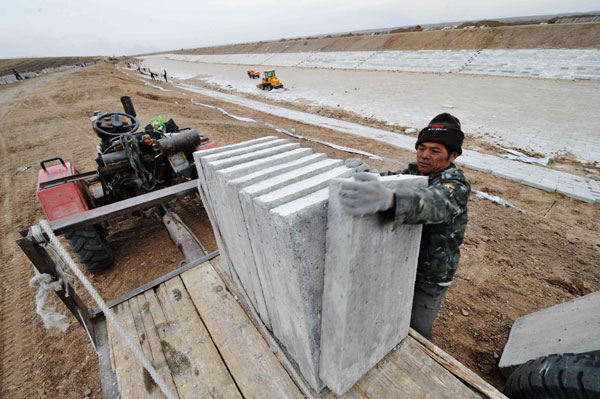In Liaozhong county in Liaoning province, 80 percent of the drainage channels no longer function because of a lack of long-term maintenance. Many farmers grow corn in the channels or even built houses on them, which means they are permanently blocked. "No one remembers these water channels until there's a flood or drought. The farmers do not want to move, so it's hard to coordinate. Moreover, the channels don't link up with each other at all," said Chen Guang, deputy director of the county's rural economic services bureau.
"I began growing crops when I was a teenager, more than three decades ago. I've never seen government workers or institutes repair the channels. When we meet disaster, all we can do is attempt to solve the problem ourselves," said Jiang Daguang, a local farmer.
In neighboring Jilin, there are more than 5.3 million hectares of farmland, but the effective irrigation area only accounts for 20 percent of the total. Less than 15 percent of the farmland is irrigated well enough to provide the water content required to grow crops.
"Currently, even the areas that are well irrigated still have many problems. The infrastructure for irrigation and water conservation is poor and lacks support facilities, they've been in a state of disrepair for many years, meaning they don't function properly. The proportion of high-quality farmland on which we can guarantee grain output is very low and the province is vulnerable to flooding and droughts," said Wang.
 |
|
A worker unloads concrete slabs for the project aimed at diverting water from the Nenjiang River in the northeastern provinces of Heilongjiang and Jilin. Wang Jianwei / Xinhua |
Provincial pledge
In Jilin, the construction of farmland irrigation and water conservation systems has lagged behind other developments in modern agriculture, but the province has pledged to abolish these conditions in the coming five to 10 years.
According to the provincial agriculture committee, the authorities have produced plans to construct, renovate and extend the construction of a number of large and medium-sized irrigation areas, promote projects to conserve water and expand the area of effective irrigation to more than 870,000 hectares within four years.
The province also plans to invest more than 18 billion yuan to construct five key water conservation projects, including a plan to divert water from the Nenjiang River to Baicheng city in the west. Statistics from the Jilin provincial water resources bureau show that more than 6 billion cubic meters of water will be transferred after these projects are put into operation. That will greatly increase and improve about 252,000 hectares of irrigation areas, resulting in a 1.5 billion kg rise in grain output.
Having gained approval from the State Council, the country's top administrative body, the central government plans to carry out a "Save water, increase grain output" campaign in the provinces of Heilongjiang, Liaoning and Jilin and in the Inner Mongolia autonomous region.
Those regions will construct water-saving irrigation areas across 2.53 million hectares, sprinkler irrigation areas of 1.07 million hectares and microsprinkler irrigation areas totaling 1.38 million hectares, by which grain output should increase by more than 10 billion kg.
However, many reservoirs and water conservation projects are in poor condition and Jilin plans to reinforce 824 damaged and dangerous small reservoirs to remove the likelihood of them being destroyed by heavy floods and devastating the surrounding farms and cities.
A complete irrigation system comprises a main ditch and branches, plus numerous channels through which water can be diverted to fields under cultivation, but construction of these systems is extremely expensive.Zheng Fengtian, deputy president of the School of Agricultural Economics and Rural Development at Renmin University in Beijing, said the central government has increased investment in the construction of farmland irrigation systems in recent years, but the funds have mainly been put into projects to build flood controls along major rivers and large reservoirs in urban areas. Little of the money has trickled down to the small and medium-sized systems, and data from a 2006 national agricultural census show that more than 70 percent of the nation's villages lack farmland irrigation and water conservation systems.
"Small-scale irrigation and water conservation infrastructures are considered to be the capillaries of the system, so building and renovating a large number of small water channels is one of the best ways to help farmers combat drought," said Wang.
Given the capital involved, Wang said that the government is still playing a leading role in the construction projects. "But in the long run, in addition to the government continuing to increase investment in the fields, society as a whole needs to become involved. We hope more farmers will become actively involved and that more funds can be raised from diverse channels and various quarters of society," he said.
In Liaoning, plans are being drawn up to improve the lives of local farmers. Between 2011 and 2015, the province plans to invest 13 billion yuan to carry out drip-irrigation projects that will help conserve water. More than a dozen cities in the province will benefit from the project and the area of irrigated fields is eventually expected to exceed more than 2.3 million hectares.
With the weather becoming warmer, construction is set to begin on a number of projects, but experts have warned that a system of strict and detailed supervision must be established as quickly as possible, to ensure that the projects are completed while the good weather lasts and to guard against them becoming breeding grounds for corruption.
Back in Jilin, Cui is despondent. "I really hope the water channels can be built in our village within my lifetime," she said.
